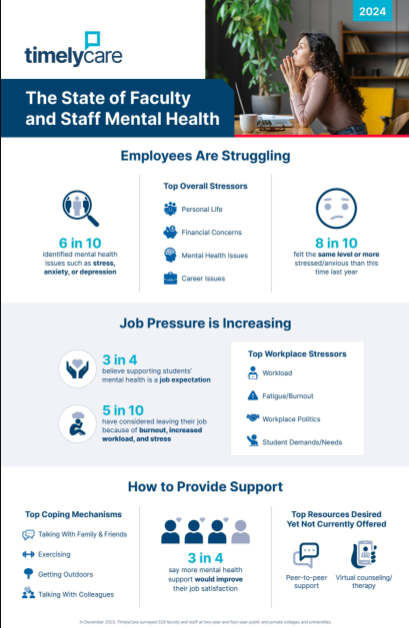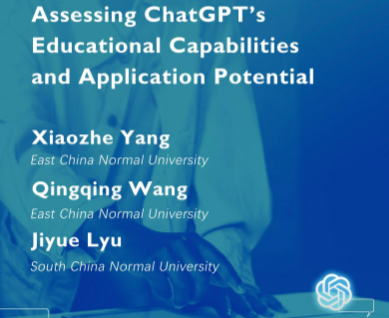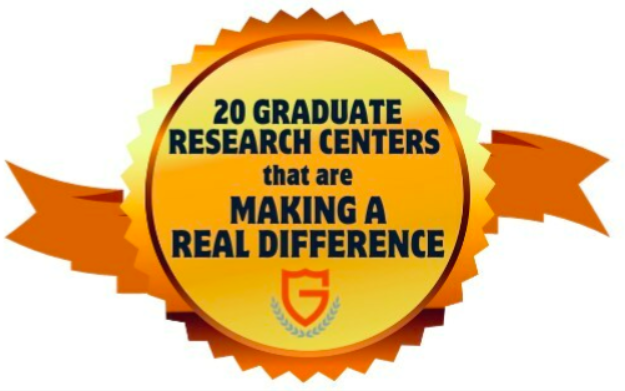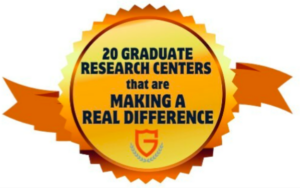Supporting students’ mental health and well-being has practically become a job expectation for higher education faculty and staff. Yet, educators on the front lines of the campus mental health crisis do not always feel that they have the support they personally need.
According to a national survey by TimelyCare, three out of four faculty and staff said more mental health support would improve job satisfaction. More than half (53%) have considered leaving their job because of burnout, increased workload and stress, underscoring continuing concerns about employee retention in the aftermath of the pandemic. The survey included more than 500 faculty and staff members at public and private four-year and two-year higher education institutions. “The weight of faculty and staff burnout and stress threatens the foundation of higher education. When faculty and staff are struggling, it’s hard for them to support students to their fullest potential,” said Dr. Bob Booth, Chief Care Officer of TimelyCare. “To build a resilient generation of future leaders, we must ensure that all campus employees receive the support they need and deserve.”

Key faculty and staff mental health survey highlights include:
- 82% are experiencing the same level or more stress and anxiety than this time last year
- 76% feel supporting students’ mental health is a job expectation
- 75% believe more mental health support would improve their job satisfaction
- 55% are experiencing mental health issues such as stress, anxiety or depression
- 53% considered leaving their job because of burnout, increased workload and stress
Their personal lives and finances are also weighing heavily on their mental health. Talking with family and friends, exercising and getting outdoors are the top ways faculty and staff cope with stress and anxiety.
Peer-to-peer support and virtual counseling/teletherapy were the top two mental health resources employees would like but are not currently offered at their institutions. “I think faculty and staff need resources more than anything. They need to know that for whatever concern that they have, there’s a resource that is easily accessible to them that they’re not going to be judged for using,” said Davien Armstrong, Case Manager, Student Resource and Empowerment Center, Tidewater Community College.
Prioritizing educators’ mental health and well-being by providing accessible mental health resources is critical to creating a supportive campus environment. TimelyCare allows colleges and universities to expand 24/7 access to employee populations such as St. Olaf University, Southern Utah University, Tidewater Community College, Virginia Tech and Western Colorado University.
“The fact that they’ve been willing to invest in a service that does have professional mental health providers, both for our students and our faculty and staff, lets us know that they care,” said McKenzie Mathewson, Associate Director of Community Wellness, Western Colorado University.
Generative artificial intelligence (AI) platforms such as ChatGPT have made a significant impact since being released in 2022. Due to their comprehensive capabilities, generative AI-powered models could vastly reshape various academic and applied fields, with education being no exception.
While certain industry experts are of the view ChatGPT may be a hinderance to traditional education, others foresee unprecedented opportunities to make learning a more diverse and adaptable experience for teachers and students alike. However, there is a lack of systematic evidence demonstrating ChatGPT’s potential in this field.
Against this backdrop, a team of researchers led by Dr. Xiaozhe Yang from the Institute of Curriculum and Instruction, East China Normal University, conducted several tests to investigate the educational capabilities of ChatGPT’s latest iteration. Their findings were made available online on November 5, 2023, in ECNU Review of Education.

First, the research team evaluated ChatGPT-4’s higher-order logical abilities using the Watson-Glaser Critical Thinking Appraisal (WGCTA) test. WGCTA is used to assess participants’ common sense, logic, and reasoning skills based on their answers to several questions. “With an overall accuracy rate of 82.5%, ChatGPT outperformed average undergraduate students in terms of critical thinking. It analyzed arguments with 100% accuracy and identified hypotheses, deductions, and explanations with an accuracy of 87.5% or higher,” states Dr. Yang. He further adds, “However, its performance in reasoning ability was average.”
To analyze ‘thinking patterns’ of the AI models, the research team used the Five Core Competencies Questionnaire.
The results indicated that ChatGPT achieved high scores in metacognition, willingness to collaborate and communicate, and problem solving. However, it exhibited a low inclination toward creativity, lacking the ability to create independently. Nonetheless, in practice, users can use appropriate prompts to elicit creative answers.
Subsequently, the team examined ChatGPT’s potential for educational applications through National Teacher Certificate Examination (NTCE) for teaching Chinese at the high-school level. ChatGPT-4 performed quite well at this test, achieving an overall accuracy of 71%. “Passing the NTCE examination signifies that ChatGPT has sufficient critical thinking to handle simple logic problems and a tendency to include core competencies in problem solving, collaboration, communication, and metacognition. Relying on a rich and extensive text dataset, ChatGPT could master relevant educational policies, teaching methods, and educational principles, as well as the professional ethics and conduct of teachers, proving its competence for performing educational work,” highlights Dr. Yang.
Overall, the findings of this study suggest that generative AI is poised to become a valuable educational tool that will likely reshape the structure of modern curricula. These models could help promote educational equity by adjusting to the needs of each student. A hopeful Dr. Yang says, “Education has entered a new era of exploration as we pursue the coexistence and co-creation of human and computer systems through iterations of generative AI.”
GradSchoolCenter.com has named the 20 graduate research centers that are integral to facilitating research and innovation efforts for academic and scientific advancement and to benefit the community at large. Numerous universities across America are a treasure trove for state-of-the-art research centers that significantly contribute to society.
These graduate schools invest considerably and obtain state support to explore interdisciplinary research work—ranging from the application and advancement of technology-focused solutions to real-world issues to the exhaustive exploration of disorders and diseases such as cancer and Alzheimer’s.

Below is a link to their ranking report:
https://www.gradschoolcenter.com/graduate-research-centers-making-real-difference/
They chose these schools based on the current and potential positive impact they make on society. Whether in advancing human technology or solving problems for the Earth and humanity, these schools are all producing students who will change the world for the better.
The 20 Graduate Research Centers That Are Making a Real Difference consist of the following, listed in random order:
- Center for Artificial Intelligence in Medicine and Imaging (Stanford University) – Stanford, California
- Cornell Lab of Ornithology (Cornell University) – Ithaca, New York
- Taub Institute for Research on Alzheimer’s Disease & The Aging Brain (Columbia University) – New York City, New York
- Pritzker Center for Strengthening Children and Families (UCLA) – Los Angeles, California
- Koch Institute for Integrative Cancer Research (MIT) – Cambridge, Massachusetts
- Duke Cardiovascular Research Center (Duke University) – Durham, North Carolina
- Alzheimer’s Disease Research Center (University of Pittsburgh) – Pittsburgh, Pennsylvania
- Center for Semiconductor Manufacturing (University of Arizona) – Tucson, Arizona
- Center for Sleep and Circadian Biology (Northwestern University)
- Biomedical Imaging Center (University of Texas at Austin) – Austin, Texas
- Genomics Center (University of Minnesota) – Minneapolis, Minnesota
- Byrd Polar & Climate Research Center (Ohio State University) – Columbus, Ohio
- Cochlear Center for Hearing & Public Health (Johns Hopkins University) – Baltimore, Maryland
- Vanderbilt Kennedy Center (Vanderbilt University) – Nashville, Tennessee
- Center for Coffee Research and Education (Texas A&M University) – College Station, Texas
- Leonard Davis Institute of Health Economics (Penn) – Philadelphia, Pennsylvania
- Yale Cancer Center (Yale University) – New Haven, Connecticut
- Adaptive Intelligent Materials & Systems Center (AIMS – Arizona State University) – Tempe, Arizona
- Blood Research Center (University of North Carolina Chapel Hill) – Chapel Hill, North Carolina
- Center for Astrophysics (Harvard University) – Cambridge, Massachusetts
The 20 graduate research centers were chosen based on specific criteria to set the standards of excellence in research and education. According to our lead researcher, Wendy Pigford, “The research centers are a hub for groundbreaking discoveries where engineers, scientists, and other accomplished experts in their fields collaborate with fellows and graduate students to cultivate an atmosphere of excellence.”
- New AI-Driven Platform Improves Health Care Oversight and Labour Mobility Bow Valley College - July 7, 2025
- First-Ever Global Student Housing Fest – Now Live - June 16, 2025
- How to Navigate the New Educational Landscape - June 12, 2025
